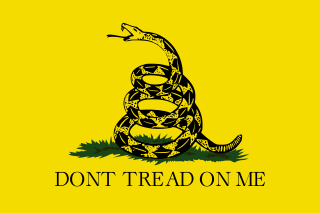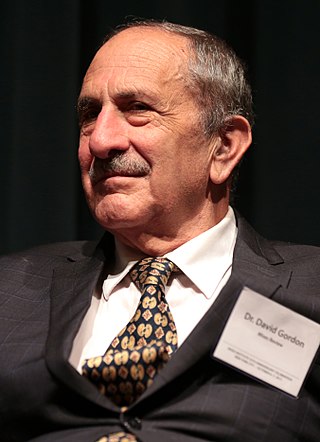Related Research Articles
Political freedom is a central concept in history and political thought and one of the most important features of democratic societies. Political freedom has been described as freedom from oppression or coercion, the absence of disabling conditions for an individual and the fulfillment of enabling conditions, or the absence of life conditions of compulsion, e.g. economic compulsion, in a society. Although political freedom is often interpreted negatively as the freedom from unreasonable external constraints on action, it can also refer to the positive exercise of rights, capacities and possibilities for action and the exercise of social or group rights. The concept can also include freedom from internal constraints on political action or speech. The concept of political freedom is closely connected with the concepts of civil liberties and human rights, which in democratic societies are usually afforded legal protection from the state.
Individualism is the moral stance, political philosophy, ideology and social outlook that emphasizes the intrinsic worth of the individual. Individualists promote realizing one's goals and desires, valuing independence and self-reliance, and advocating that the interests of the individual should gain precedence over the state or a social group, while opposing external interference upon one's own interests by society or institutions such as the government. Individualism makes the individual its focus, and so starts "with the fundamental premise that the human individual is of primary importance in the struggle for liberation".

Political philosophy or political theory is the philosophical study of government, addressing questions about the nature, scope, and legitimacy of public agents and institutions and the relationships between them. Its topics include politics, justice, liberty, property, rights, law, and the enforcement of laws by authority: what they are, if they are needed, what makes a government legitimate, what rights and freedoms it should protect, what form it should take, what the law is, and what duties citizens owe to a legitimate government, if any, and when it may be legitimately overthrown, if ever.

Robert Nozick was an American philosopher. He held the Joseph Pellegrino University Professorship at Harvard University, and was president of the American Philosophical Association. He is best known for his book Anarchy, State, and Utopia (1974), a libertarian answer to John Rawls' A Theory of Justice (1971), in which Nozick proposes his minimal state as the only justifiable form of government. His later work Philosophical Explanations (1981) advanced notable epistemological claims, namely his counterfactual theory of knowledge. It won the Phi Beta Kappa Society's Ralph Waldo Emerson Award the following year.

John Bordley Rawls was an American moral, legal and political philosopher in the modern liberal tradition. Rawls has been described as one of the most influential political philosophers of the 20th century.

Self-ownership is the concept of property in one's own body, often expressed as the moral or natural right of a person to have bodily integrity meaning the exclusive right to control one's own body including one's life, where 'control' means exerting any physical interference and 'exclusive' means having the right to install and enforce a ban on other people doing this. Since the legal norm of property title claim incapacitates other people from claiming property title over the same resource at the same time, the right to control or interfere with one's own body in any arbitrary way is secured. Anarcho-capitalism defines self-ownership as the exclusive right to control one's body as long as the owner does not aggress upon others, leading to the concept of the sovereign individual. In Minarchism the 'exclusive right' is understood by separating the 'liberty-to' from the 'liberty-from' where for each person the 'liberty-to' is restricted by all the 'liberty's-from' of others, effectively subjecting the 'liberty-to' to the ban on the usage of force. Thereafter self-ownership means the exclusive right to control one's body insofar considering action between inhabitants and not involving the state, making it roughly a pacifist morality only among inhabitants. Self-ownership is a central idea in several political philosophies that emphasize individualism, such as libertarianism and liberalism.

Liberty is the state of being free within society from oppressive restrictions imposed by authority on one's way of life, behavior, or political views. The concept of liberty can have different meanings depending on context. In the Constitutional law of the United States, Ordered liberty means creating a balanced society where individuals have the freedom to act without unnecessary interference and access to opportunities and resources to pursue their goals, all within a fair legal system.
The nature of capitalism is criticized by left-wing anarchists, who reject hierarchy and advocate stateless societies based on non-hierarchical voluntary associations. Anarchism is generally defined as the libertarian philosophy which holds the state to be undesirable, unnecessary and harmful as well as opposing authoritarianism, illegitimate authority and hierarchical organization in the conduct of human relations. Capitalism is generally considered by scholars to be an economic system that includes private ownership of the means of production, creation of goods or services for profit or income, the accumulation of capital, competitive markets, voluntary exchange and wage labor, which have generally been opposed by most anarchists historically. Since capitalism is variously defined by sources and there is no general consensus among scholars on the definition nor on how the term should be used as a historical category, the designation is applied to a variety of historical cases, varying in time, geography, politics and culture.

The non-aggression principle (NAP), also called the non-aggression axiom, is the legal or moral rule that states that any person is permitted to do everything with their property except aggression, which is in turn defined as the initiation of forceful action, which is in turn defined as 'the application or threat of' 'physical interference or fraud ', any of which without consent. The principle is also called the non-initiation of force. The principle incorporates universal enforceability.
Richard E. Flathman was the George Armstrong Kelly Professor of Political Science, emeritus, at Johns Hopkins University. He is known for having pioneered, with Brian Barry, David Braybrooke, Felix Oppenheim, and Abraham Kaplan, the application of analytic philosophy to political science. He was a leading advocate of liberalism and a champion of individuality. He defended a conception of social freedom according to which it is "negative, situated, and elemental."
Left-libertarianism, also known as left-wing libertarianism, is a political philosophy and type of libertarianism that stresses both individual freedom and social equality. Left-libertarianism represents several related yet distinct approaches to political and social theory. Its classical usage refers to anti-authoritarian varieties of left-wing politics such as anarchism, especially social anarchism, communalism, and libertarian Marxism, collectively termed libertarian socialism. A portion of the left wing of the green movement, including adherents of Murray Bookchin's social ecology, are also generally considered left-libertarian.
Libertarianism is a political philosophy that upholds liberty as a core value. Libertarians seek to maximize autonomy and political freedom, emphasizing equality before the law and civil rights to freedom of association, freedom of speech, freedom of thought and freedom of choice. Libertarians are often skeptical of or opposed to authority, state power, warfare, militarism and nationalism, but some libertarians diverge on the scope of their opposition to existing economic and political systems. Various schools of libertarian thought offer a range of views regarding the legitimate functions of state and private power. Different categorizations have been used to distinguish various forms of Libertarianism. Scholars distinguish libertarian views on the nature of property and capital, usually along left–right or socialist–capitalist lines. Libertarians of various schools were influenced by liberal ideas.

In the United States, libertarianism is a political philosophy promoting individual liberty. According to common meanings of conservatism and liberalism in the United States, libertarianism has been described as conservative on economic issues and liberal on personal freedom, often associated with a foreign policy of non-interventionism. Broadly, there are four principal traditions within libertarianism, namely the libertarianism that developed in the mid-20th century out of the revival tradition of classical liberalism in the United States after liberalism associated with the New Deal; the libertarianism developed in the 1950s by anarcho-capitalist author Murray Rothbard, who based it on the anti-New Deal Old Right and 19th-century libertarianism and American individualist anarchists such as Benjamin Tucker and Lysander Spooner while rejecting the labor theory of value in favor of Austrian School economics and the subjective theory of value; the libertarianism developed in the 1970s by Robert Nozick and founded in American and European classical liberal traditions; and the libertarianism associated with the Libertarian Party, which was founded in 1971, including politicians such as David Nolan and Ron Paul.
The law of equal liberty is the fundamental precept of liberalism and socialism. Stated in various ways by many thinkers, it can be summarized as the view that all individuals must be granted the maximum possible freedom as long as that freedom does not interfere with the freedom of anyone else. While socialists have been hostile to liberalism, which is accused of "providing an ideological cover for the depredation of capitalism", scholars have stated that "the goals of liberalism are not so different from those of the socialists", although this similarity in goals has been described as being deceptive due to the different meanings liberalism and socialism give to liberty, equality and solidarity, including the meaning, implications and norms of equal liberty derived from it.

Libertarianism is variously defined by sources as there is no general consensus among scholars on the definition nor on how one should use the term as a historical category. Scholars generally agree that libertarianism refers to the group of political philosophies which emphasize freedom, individual liberty and voluntary association. Libertarians generally advocate a society with little or no government power.
George Molnar (1934–1999) was a Hungarian-born philosopher whose principal area of interest was metaphysics. He worked mainly in the Philosophy Department at the University of Sydney but resided in England from 1976 to 1982. He published four philosophical papers in two separate spells; the first two in the 1960s and the second two after a return to the profession in the 1990s. His book Powers: A Study in Metaphysics was published posthumously in 2003.

David Gordon is an American libertarian philosopher and intellectual historian influenced by Murray Rothbard's views of economics. He is a senior fellow of the Ludwig von Mises Institute, a libertarian think tank, and is the editor of The Mises Review.
Carol C. Gould is an American philosopher and feminist theorist. Since 2009, she has taught at City University of New York, where she is currently Distinguished Professor of Philosophy at Hunter College, and in the Doctoral Programs of Philosophy and Political Science at the CUNY Graduate Center, where she is Director of the Center for Global Ethics and Politics at the Ralph Bunche Institute. Gould is also editor-in-chief of the Journal of Social Philosophy. Her 2004 book Globalizing Democracy and Human Rights received the 2009 David Easton Award which is given by the American Political Science Association "for a book that broadens the horizons of contemporary political science." Her 2014 book Interactive Democracy: The Social Roots of Global Justice received the 2015 Joseph B. Gittler Award from the American Philosophical Association for "an outstanding scholarly contribution in the field of the philosophy of one or more of the social sciences."

Karl Widerquist is an American political philosopher and economist at Georgetown University on its campus in Qatar. He is best known as an advocate of basic income, but is also an interdisciplinary academic writer who has published in journals in fields as diverse as economics, politics, philosophy, and anthropology. He is a consistent critic of propertarianism, right-libertarianism, social contract theory, and the belief that modern societies fulfill the Lockean proviso.
References
- ↑ "Steiner, Prof. Hillel Isaac", Who's Who (online edition, Oxford University Press, December 2017). Retrieved 15 June 2018.
- ↑ "Prof. Hillel Steiner's page at the University of Manchester".
- ↑ "Prof. Hillel Steiner's page at the University of Arizona".